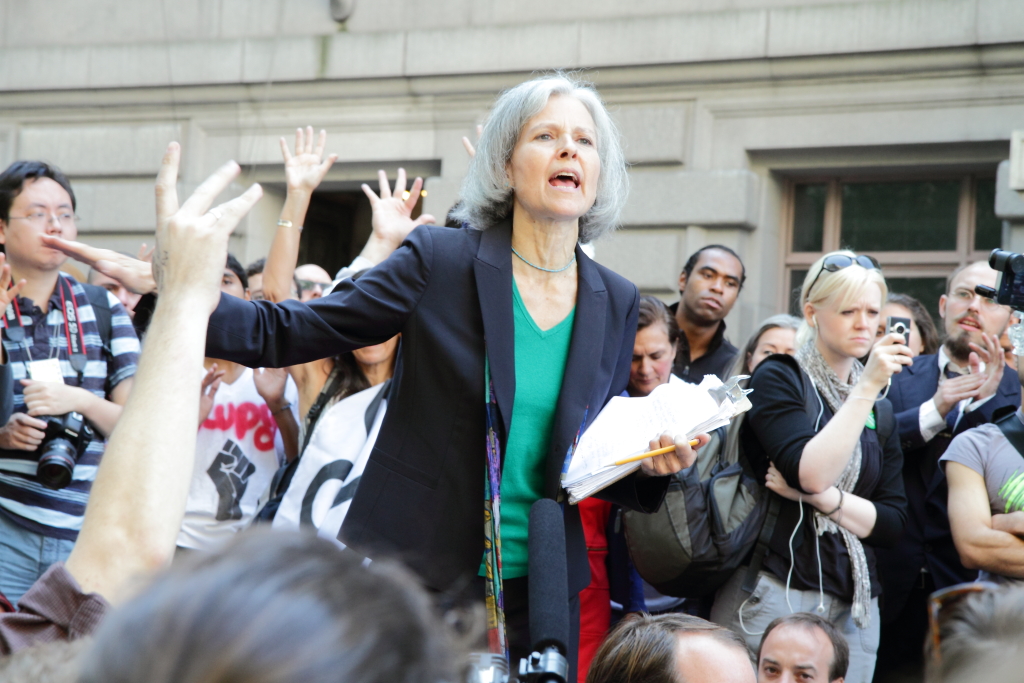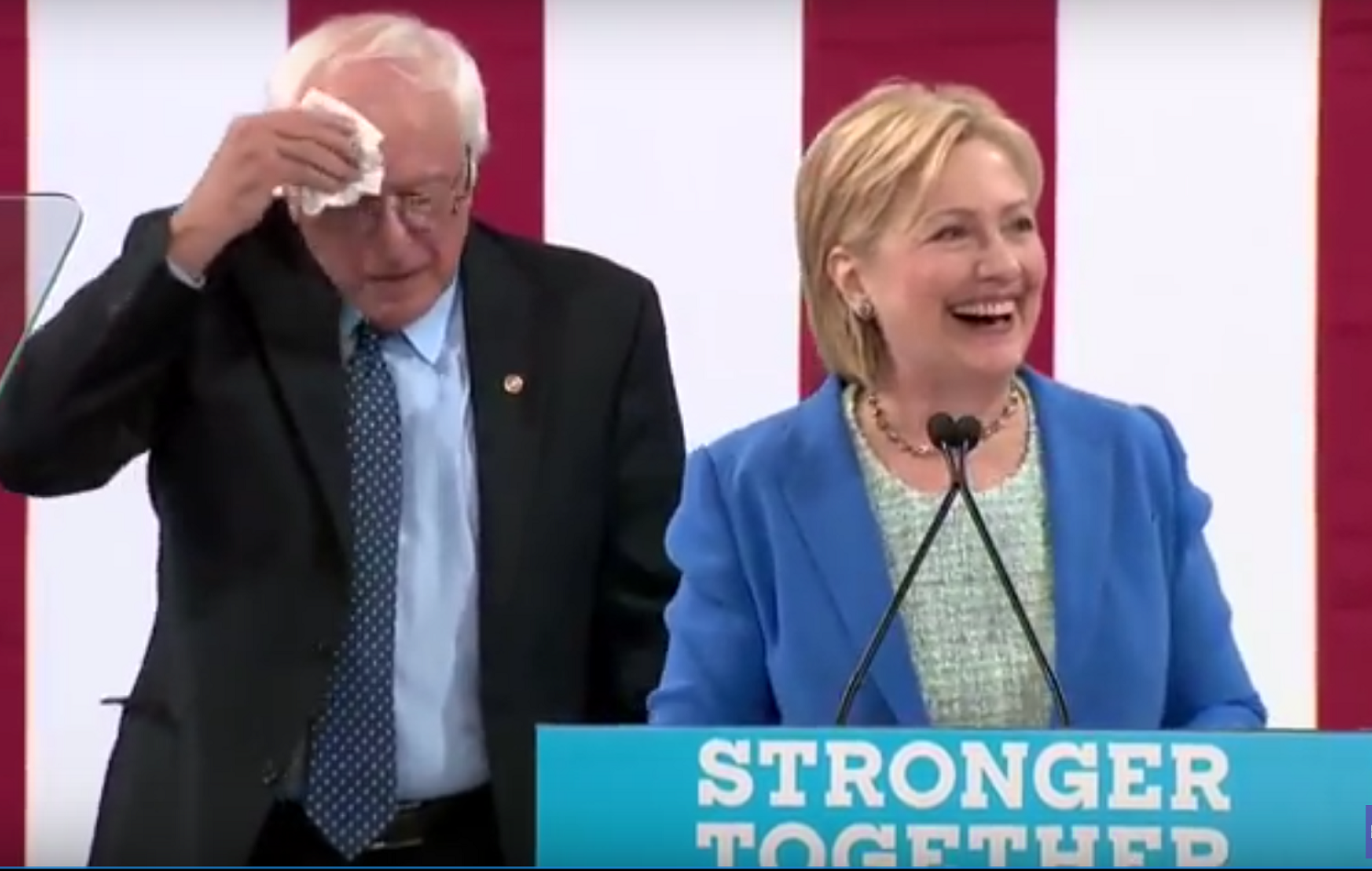With the crowning of Hillary Clinton at the DNC in Philadelphia, the 2016 election cycle appears to have come full circle. She began as the frontrunner twelve months ago, and she is now officially the party's nominee. However, what we have passed through over the last few months is not a circle, but a contradictory spiral of development. The river of American political struggle has overflowed, and while Sanders' capitulation will inevitably lead to a temporary ebbing of the tide, its course has been changed forever.
Many Sanders supporters are understandably disappointed and angry. A truly historic opportunity has been missed. But there are many positive lessons to be drawn from this experience, and there are many reasons to be optimistic when it comes to the future of the socialist revolution in the United States. First and foremost, we must keep the long view of history in mind. It is an undeniable fact that interest in socialism has hit the mainstream. The significance of this development, especially in a country that was subjected to decades of anti-communist hysteria, should not be underestimated.
Let's not forget that just two presidential cycles ago, Barack Obama's abstract promises of “hope” and “change we can believe in” were sufficient to propel him to the White House. But as the capitalist crisis deepened and dragged on, the problems facing working Americans only got worse. The eventual result was Occupy Wall Street, which introduced the idea of the “99% versus the 1%”—a much sharper “us versus them” formulation. Black Lives Matter put racism and police brutality front and center, once again, an “us versus them” perspective on how society is structured. Then came Bernie Sanders, who rallied millions with his electrifying call for a “political revolution against the billionaire class”—a clear reference to class and revolution. In short, the speed with which millions of Americans' outlook has shifted to the left is almost breathtaking. However, not all American workers have moved to the left. Confronted by crisis and instability, millions have been drawn to the right-wing populism of Donald Trump. How can we explain this?
Polarization in a political vacuum
During the prolonged economic upswing that followed World War II, a layer of skilled workers, and in particular, white workers, was granted a few more crumbs than the rest, as part of a conscious policy to “divide and conquer” the working class along racial lines. The “American Dream” seemed to be a reality for millions. The quality of life available to high school-educated factory workers would make most white-collar workers today envious: widespread access to higher education for their children, a social safety net, generous health care benefits, pensions, and paid holidays. The class struggles of the 1930s and 1940s faded into memory; McCarthyism and the craven policies of the Communist Party led to the purging of the left from unions; the rank and file let down its guard on the basis of gradually improving wages and conditions; and the union leaders drifted far to the right, in effect fusing with capitalist Democratic party.
The world economic crisis of 1974 signaled the end of this anomalous period. Over the last 40 years, the hard-won gains of the past have been rolled back and the unions have been numerically decimated. Although worker productivity has doubled since the 1970s, purchasing power has stagnated or declined for most workers, health care and educational costs have skyrocketed, and the idea of summer vacations and a comfortable retirement is entirely out of reach for most American workers and youth.
The 2008 economic crisis marked a critical turning point in the history of world capitalism. Confidence in the system was badly shaken. Millions of jobs were lost, millions of homes foreclosed—and Wall Street got richer than ever. It took seven years for the number of employed workers to reach pre-crisis levels, and this does not include the millions who have entered the workforce since then. GDP has averaged just 2.4% over last 10 years, which would typically be considered a “growth recession.” What little growth there has been has gone almost exclusively to the rich. The world's richest 1%—a large proportion of whom reside in the US—have more wealth than the other 99% of the population. This is a fact, not an exaggeration. Far from offering a way forward, the trade union leaders have become an objective obstacle to the development of the class struggle, moving might and main to prevent the unleashing of the colossal power of the American working class.
Over the course of the last century, the US ruling class, aided by the labor bureaucracy, successfully prevented the formation of a mass working class party. In fact, the US is the only advanced industrialized country in which the workers have never had a mass political expression of their own. After years of crisis, US workers turned to the 2016 presidential elections as an outlet to express their frustrations. In a country where two capitalist parties have dominated political life for a century and a half, it is only natural that the workers turned first to these institutions for a way out. But these parties cannot offer a solution. Both the Republicans and the Democrats represent the capitalists, a rotten and decaying class that no longer has a progressive historic role to play in society. The profound instability of the system has led to deep divisions within the ruling class, who are no longer able to rule in the old way, but have no idea what else to do. Every measure they take to reestablish economic equilibrium only exacerbates the political and social disequilibrium, and vice versa.
Into the void stepped two bold candidates with combative anti-establishment messages. Both Trump and Sanders represent “historical accidents” who in different ways have channeled the working class's burning desire to fight back against the bosses and their bought-and-paid-for politicians. They successfully tapped into reserves of pent-up discontent so deep that even the Marxists could not have predicted how far their campaigns would go.
 Homeless tent city in Seattle Washington - Photo: Joe Mabel CC BY-SA 3.0As the American Dream fades into memory, and with no fighting lead by the labor leaders, many workers have fallen prey to the anti-establishment-cloaked racism, misogyny, and xenophobia of demagogues like Donald Trump. However, before whole swathes of the US working class are written off as hopeless racists and sexists, it is important to understand that the essence of conservatism among American workers is the desperate desire to cling to what little stability remains in a world that seems to have gone insane. Confronted by colossal, confusing forces beyond their control, there is a visceral desire to find something firm and immutable to hold on to. This can take many forms, including regional, religious, sexual, racial, and even trade union identity, and more often than not these overlap.
Homeless tent city in Seattle Washington - Photo: Joe Mabel CC BY-SA 3.0As the American Dream fades into memory, and with no fighting lead by the labor leaders, many workers have fallen prey to the anti-establishment-cloaked racism, misogyny, and xenophobia of demagogues like Donald Trump. However, before whole swathes of the US working class are written off as hopeless racists and sexists, it is important to understand that the essence of conservatism among American workers is the desperate desire to cling to what little stability remains in a world that seems to have gone insane. Confronted by colossal, confusing forces beyond their control, there is a visceral desire to find something firm and immutable to hold on to. This can take many forms, including regional, religious, sexual, racial, and even trade union identity, and more often than not these overlap.
While making no excuses or concessions to the racism and sexism of many workers, which must be energetically combatted, the real key to understanding Trump's popularity lies in his anti-establishment message. Given a militant and independent working class alternative, many Trump supporters could actually be won to socialism. On the basis of the concrete and tangible improvements in quality of life that only socialism can offer, their pragmatism would in time lead them to view socialist ideas and measures as “good common sense.”
Social and political polarization
Under the hammer blows of the capitalist crisis, the so-called “center” of American politics has disintegrated and the historically narrow political spectrum has been blown apart. On what serves as the left in American politics, Bernie Sanders' at-first virtually unnoticed campaign exploded into the mainstream. Objectively speaking, Sanders is mildly reformist at best. His proposals do not seek to impinge on capitalist private property in any way shape or form. But in the context of the United States, his fiery anti-Wall Street rhetoric struck a chord. The fact that millions of Americans—and not only the youth—now say they would vote for a socialist or even a communist marks a tidal change in the situation.
Although he had never before been a member of the Democratic Party, Sanders decided against an independent run and instead hitched his campaign to the DNC machine. We explained at the time that we believed this was a crucial mistake, as it would foment unrealizable illusions in the pro-capitalist Democratic Party as a vehicle for fundamental social change. Though an independent run would have received less media attention, it could have laid the foundations for something viable outside the two major parties.
When Bernie first announced his candidacy, he was given an ice cube's chance in hell of getting anywhere near the nomination. But he was in the right place at the right time, and his campaign took off like a rocket, giving Clinton and the DNC establishment one hell of a scare. He won primaries and caucuses in 23 states, a total of 13 million votes, and received 1,900 delegates for the Democratic National Convention. Hundreds of thousands attended his rallies. Clinton and the Democratic Party have been gravely wounded and American politics has been transformed forever. Nonetheless, his attempt to reform the Democratic Party from within took a face plant when he buckled to the pressure and endorsed Clinton, the most widely despised Democratic presidential nominee in recent history. This confirms yet again that the Democratic Party is the “graveyard of progressive movements.” Bernie's capitulation has given them a brief reprieve, but the damage to the party has been done, and the seams will unravel all the more quickly as events continue to stress US capitalism and its political pillars in the years ahead.
On the right of the political spectrum, the cultural caricature of “The Donald” has been catapulted from reality TV mainstay and pro wrestling heel to the doorstep of the world's most powerful office. In 1999, Trump told the Wall Street Journal: “Yes, I am considering a run for president. … Unlike candidates from the two major parties, my candidacy would not represent an exercise in career advancement. I am not a political pro trying to top off his resume. I am considering a run only because I am convinced the major parties have lost their way. The Republicans are captives of their right wing. The Democrats are captives of their left wing. I don’t hear anyone speaking for the working men and women in the center.”
But he too abandoned his independent stance and took his demagogic message into the heart of the Republican Party. Unlike Bernie, he actually succeeded in winning the nomination. In the process, he has blown apart the modern Republican Party, and if he doesn't finish the demolition job, Ted Cruz will be happy to assist.
Bernie and the DNC

With candidates like George W. Bush, John McCain, and Sarah Palin, the Republican National Convention has long been the target of mass protests. However, it has been many decades since so many protesters descended upon the Democratic National Convention to protest against it from the left. Thousands of Bernie delegates and supporters streamed to Philadelphia to pressure him to retract his endorsement of Clinton, and to run against both her and Trump as a third-party independent. After skewering Hillary on the campaign trail and exposing her as big business's preferred candidate, how could he possibly follow through on his promise to endorse her?
Adding fuel to the anti-establishment fire, on the eve of the convention, Wikileaks released 20,000 internal emails from the DNC which clearly showed that, far from impartially facilitating the party's primaries and caucuses, the Democratic Party machine was fully behind Clinton from the get-go, and did everything in its power to block Sanders from winning. Despite all of this, Sanders apparently still believed that if he sold his political soul, he could somehow gain leverage in a party controlled by Wall Street and an army of cynical bureaucrats. He hung his hopes on the new Democratic Party platform, which he repeatedly referred to as the “most progressive” in the party's history. However, like campaign trail promises, the platform of a bourgeois party holds no weight, as they are not binding on elected officials and are unceremoniously shelved once the election is over and “the real world” of bipartisan politics sets in. In the end, Sanders was reduced to playing the role of a “Pied Piper” leading his followers into the jaws of the Democrats.
But his supporters were not inclined to give in so easily. Before the opening of the carefully stage-managed convention, large crowds marched across Philadelphia chanting: “Bernie beats Trump!” “Hell no, DNC, we won't vote for Hillary!” and even “Hell no, DNC, party of the bourgeoisie!” Sanders spent the hours before formalizing his capitulation trying to minimize the backlash, texting his supporters and urging them not to “engage in any kind of protest on the floor.” When he finally faced his delegates in advance of the official nomination process, they excitedly cheered the news that Debbie Wasserman Schultz, the hated architect of the party's anti-Sanders machinations, was resigning as chair of the DNC. But when he urged them to vote for Clinton, glumly asserting that this is the “real world,” he was met with a prolonged chorus of boos. Nevertheless, they still held out hope that he would change course at the last moment and broke into chants of “We Want Bernie!”
Outside the convention center, around a cellphone streaming Bernie's speech to his delegates, confusion turned to disbelief then fury: “he's a f*cking sellout!” While the news was slow to seep into the crowd, many began turning their “Bernie” signs upside down.

When the time came to finalize the nomination, Sanders made a motion to suspend procedural rules, calling on the convention to nominate Clinton by general acclamation. Stunned by this final betrayal hundreds of Sanders delegates, many of them in tears, led a walk-out from the building. As delegate Miguel Angel Zuniga from Los Angeles explained, “They've been bought. ...The world is watching us and what they're taking from this is that anybody with power or money could be our president.” Delegate Luis Eric Aguilar from Illinois, who held a sign that read “Hillary delegates acted like Trump supporters,” expressed his disgust: “Everything we learned about Bernie's campaign is everything standing up against Hillary's. They're the ones with money, backed by corporations and the banks. We're backed by millions around the nation.”
Around the convention center signs such as “#DemExit” and “Bernie Betrayed Us” began to pop up. A mass de-registration from the Democratic Party rolls was organized in front of Philadelphia's City Hall. In conversations with Bernie supporters, many told IMT members categorically that they would never again fall for the “bait and switch” or vote for the Democrats.
Inside the convention hall, liberal darlings such as Al Franken, Cory Booker, and Elizabeth Warren tied themselves and their “progressive” credentials to the Titanic that is the Clinton campaign. Sarah Silverman indignantly declared that the “Bernie or Bust” delegates “were being ridiculous.” What is ridiculous is assuming people should vote for Clinton when they disagree with her and want something else. Former Secretary of State Madeleine Albright—who infamously said there is a special place in hell for women who do not vote for Hillary—made a crass case for Clinton's blatantly imperialist credentials. The hundreds of empty seats formerly occupied by Sanders delegates were reportedly filled with people recruited for pay through an ad on Craigslist, in order to keep the hall full for the TV cameras. Even the small victory of Debbie Wasserman Schultz's resignation was short-lived, as Hillary slapped Sanders's supporters in the face by promoting her to “honorary co-chair” of her campaign. In this context, the “historic nomination of the first female presidential nominee major party” rang hollow for millions of women whose class instincts had drawn them towards Sanders.
After dragging his supporters kicking and screaming into the odious and corrupt swamp of the Democratic Party, Sanders announced that he was quitting the Democrats after all, and returning to the Senate as an independent. For many, this only added insult to injury. Others hold out hope that he may yet serve as a point of reference in the future. Only time will tell how all of this shakes out. What is clear is that Sanders was in a unique position. He could have lifted a little finger and changed the course of US history forever. He could have led millions of radicalized youth and workers out of the Democratic Party and formed a new party with a mass base that could easily give the Democrats and Republicans a run for their money. 65% of Millennial voters wanted him to reject Clinton and run as an independent. 50% of all American voters consider themselves independents, a plurality, which could have actually won the presidency this electoral cycle. Many polls show that Sanders had the best chance of beating Trump. Even Donald Trump grasped the significance of Bernie's capitulation. At a rally in North Carolina he said Sanders was “losing his legacy. … He's just sort of given up.” Cynically seeking to tap into Sanders supporters' anti-establishment sentiments, he tweeted: “While Bernie has totally given up on his fight for the people, we welcome all voters who want a better future for our workers.”
Sanders claims the American socialist Eugene Debs as one of his political inspirations. Debs, in a crushing reply to lesser-evil arguments, famously stated that it is “better to vote for what you want and not get it, than to vote for what you don't want, and get it.” But when push came to shove, Sanders did not stick to his guns. In the end, he kept his word to endorse Clinton, but not his word to the millions who wanted him to lead the fight against Wall Street and its politicians.
Bernie awakened a giant—millions of workers and youth who were willing to pioneer a new era of American politics. One explanation for his downfall is his lack of confidence in his supporters and their willingness to fight to the end for “political revolution against the billionaire class.” Without a class analysis, an understanding that once organized and mobilized, the working class is the most powerful social force on the planet, he caved to the pressures of political horse-trading at the top. But another possible explanation is that he himself was terrified by the forces he had unleashed, and under the merciless pressure of the ruling class, he used his remaining influence to dampen the fire before it got out of control. Blowing apart the oldest party in American politics, a key institution of capitalist rule in the US and around the world, was not part of the script. Either way, this is an clear lesson in the betrayal that is inherent in reformism, especially left reformism. Like Tsipras in Greece or Hollande in France, those who do not break with the capitalist system will inevitably end up implementing the same policies as the main capitalist parties.
Perspectives for election 2016
Who will be the next occupant of the White House? Reason, logic, and many opinion polls would indicate the US will soon have its first woman president. But reason, logic, and opinion polls are not applicable in times such as these. Other polls show Trump running dead even or even ahead. It is said that a week is an eternity in politics—and there are many weeks between now and November. It is therefore impossible to say for certain, but we can categorically state that it is a lose-lose contest for the working class. Neither of the candidates represents the interests of the working class majority, a conclusion already drawn by millions. Millions more will learn the hard way through the bitter experience of the next presidency.
Trump represents the distilled essence of short-sighted capitalist arrogance and demagogy. He is a representative par excellence of the “naked cash nexus” of human and social relations referred to by Marx in the Communist Manifesto. He represents a world in which lying, cheating, duping, wheeling and dealing are considered the highest of virtues. No class conscious worker wants Trump to be the next Executive-in-Chief. But we must be clear: If Trump wins, it will be the fault of the so-called “lesser evil” policy, of the trade union leaders for not providing an alternative, and yes, of Bernie Sanders. The key question is not, “how can we stop Trump in 2016?” but rather, “how can we put an end to capitalism, which gives rise to the Trumps and Clintons of the world?” This is the question the “Bernie or Bust” supporters must ask themselves.
Many people have sincere illusions in Clinton. In a country rife with the poison of sexism, the nomination of the first female candidate by a major party is seen as a step forward by many. They want to defeat Trump, and sincerely believe she is more “electable.” But we must bear in mind that despite the impact made by Sanders's anti-Wall Street campaign, millions have not yet drawn the conclusion that the system itself must be attacked. Many others who have drawn this conclusion are hesitant to leave the safe confines of the familiar name and policies she provides.
Many others detest Clinton but will nevertheless vote for her in order to stop Trump. However, the lesser evil game has its limits. The flip side of this strategy is the eventual victory of the greater evil. Lesser evilism is also used to cow and marginalize those who understand that a revolution will require much more than merely electing a “better” or “worse” candidate. We are fighting for a fundamental change of economic and political relations, not mere cosmetic changes at the top. For this we need not only the numbers but political education, organization, and activity.
The same disappointment that followed Obama's election will be redoubled if Clinton wins. Even if she “beats” Trump in November, the problems that gave rise to his popularity cannot be resolved within capitalism. But Clinton knows no other parameters. Another economic crisis is in the cards and the reaction of the workers will not be shock and paralysis as in 2008, but anger and mass mobilization. And if she fails to defeat Trump, political deal-making in Congress will not be sufficient to stop his attacks. Mass strikes, protests, and demonstrations, factory, workplace, and campus occupations, general strikes, and ultimately revolution will be on the agenda if we want to stop him and his ilk.
 Jill Stein - Photo by Paul Stein CC BY SA 2.0
Jill Stein - Photo by Paul Stein CC BY SA 2.0
Before endorsing Clinton, Sanders spurned an offer from Jill Stein to run as the Green Party's candidate. As she echoes many of Sanders's progressive positions, interest in her candidacy has grown since his capitulation and she will surely win many of his voters. But the Green Party has neither the name recognition, national scope, or mass enthusiasm that Sanders squandered, and the party is unlikely to make a significant impact in the November. Nonetheless, in the absence of an alternative, we should never say never. Only time and events will tell, and the Marxists will follow this and other efforts to harness the energy of Sanders's campaign closely.
The fight for socialism is just beginning!
Millions of Sanders supporters are in shock and many feel a deep sense of betrayal. But there is no need for dejection or disillusionment. The real surprise is that his campaign went so far. Although the perspective for a new mass political party of the working class has again been delayed, the events of the last few months are proof that the potential for a socialist revolution in the United States is not as far off as most people would have imagined. This should fill us with tremendous enthusiasm and optimism for the future. Blocked on this political front, other political avenues will inevitably open up, and sooner or later, in one form or another, a mass socialist party of the working class will be created. And while strike levels remain historically low, the workers will eventually make a breakthrough in their efforts to fight collectively against the bosses, which will unleash a new era of strikes and lead to the rise of new leaders and unions.


